MercoPress. South Atlantic News Agency
Tag: Bank of England
-
Monday, September 24th 2018 - 08:30 UTC
Sir Alan Duncan praises the longstanding business links between UK and Chile
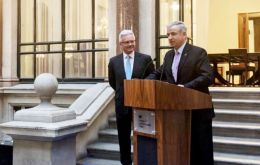
A delegation of over 500 investors and businesspersons, as well as officials from the Chilean government, participated on 6 to 7 September in the 13th version of ChileDay. This 2 day event held in London at the Foreign and Commonwealth Office promoted the Chilean financial market to a UK audience.
-
Friday, September 14th 2018 - 08:22 UTC
Governor Carney warns of economic chaos and property crash in a no-deal Brexit

Bank of England governor Mark Carney has delivered a “chilling” warning to Theresa May’s cabinet that a no-deal Brexit could lead to economic chaos, including a property crash that could see house prices fall by a third.
-
Wednesday, September 12th 2018 - 08:49 UTC
Mark Carney will steer BoE during the Brexit process; parliament and financial markets approval

Bank of England Governor Mark Carney will stay at the central bank an extra seven months until the end of January 2020 to help smooth Britain's departure from the European Union next year, finance minister Philip Hammond told parliament on Tuesday.
-
Thursday, August 9th 2018 - 06:38 UTC
Pound falls below US$ 1.29 for the first time in almost a year
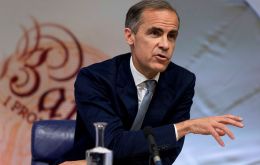
The pound has fallen below US$1.29 for the first time in almost a year on continuing worries Britain will leave the EU without a trade deal. Sterling also hit a nine-month low against the euro, and was down against the yen and Swiss franc.
-
Saturday, August 4th 2018 - 12:04 UTC
The possibility of a “no deal Brexit is uncomfortably high”, wars Carney
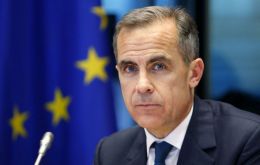
Bank of England Governor Mark Carney said on Friday Britain faces an “uncomfortably high” risk of leaving the European Union with no deal, comments that drove sterling to an 11-day low against the dollar.
-
Friday, August 3rd 2018 - 09:27 UTC
Bank of England rate hike, but “policy needs to walk not run”, says Carney
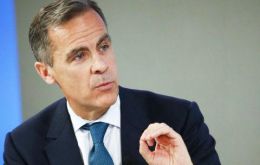
The Bank of England announced a rate hike despite ongoing uncertainty over the future of the U.K. economy. The Monetary Policy Committee voted unanimously for an increase in rates from 0.5 to 0.75% on the back of a strong labor market and credit growth.
-
Thursday, June 14th 2018 - 08:54 UTC
UK inflation steady at 2.4% in May, but fuel prices are climbing fast

Inflation in the UK remained at 2.4% in May, according to the Office for National Statistics (ONS), after its fall was halted by a sharp rise in fuel costs. The ONS said that fuel prices increased by the biggest monthly amount since January 2011, rising by 3.8%.
-
Friday, May 11th 2018 - 06:12 UTC
Bank of England leaves interest rates unchanged, slashes 2018 growth prospects
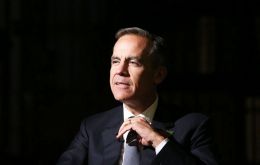
The Bank of England has backed off from raising interest rates as it slashed 2018 growth forecasts, but said the economy would bounce back from a weather-hit “soft patch”. Policymakers kept the prospect of rate hikes firmly on the cards, although it sparked confusion over when the next increase may come.
-
Friday, April 27th 2018 - 12:36 UTC
UK economy grows at its slowest since 2012 in Q1; pound falls to US$ 1.380

The UK economy grew at its slowest rate since 2012 in the first quarter of the year, the Office for National Statistics (ONS) has said. GDP growth was 0.1%, down from 0.4% in the previous quarter, driven by a sharp fall in construction output and a sluggish manufacturing sector.
-
Tuesday, April 17th 2018 - 07:54 UTC
Pound in strong sustained run against the US dollar
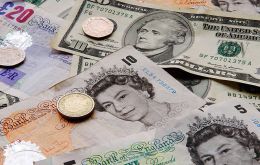
The pound has continued its recent strong run against the dollar pushing firmly above US$ 1.43. It is the seventh session in a row that the pound has made gains against the US currency. The strong run means that, among the G10 group of rich nations, the UK has the best-performing currency this year.
